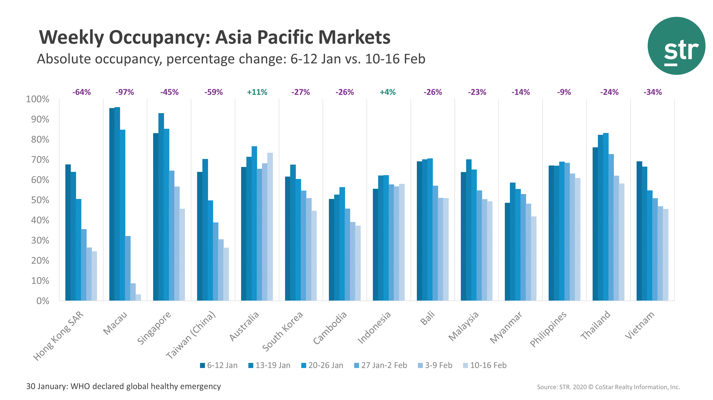As more cases of COVID-19 are increasing across the globe, concerns relating to the spread of the virus, large-scale travel restrictions, and events being cancelled or postponed are having a direct negative impact on hoteliers across the Asia-Pacific region.
According to preliminary February data from STR, “Top Asia Pacific destinations for Mainland China outbound travelers such as Singapore and Bangkok continue to report a hotel occupancy negative impact amid the outbreak of coronavirus (COVID-19)”.
The key to alleviating the impact of virus outbreak emergencies on businesses is being nimble. This means re-thinking your marketing efforts to make them more relevant.

Hoteliers need to explore how their marketing teams can re-assess and implement planned marketing funds to generate alternative business and new markets. Due to large-scale restrictions and travel bans, it is obvious there are fewer people traveling and booking hotels. This means, you need to adjust your campaign funds and eliminate some of your digital marketing campaigns which do not generate bookings. However, there are some digital marketing campaigns you will need to leverage on, such as Search Engine Optimisation (SEO) to mitigate the impact of the virus outbreak in the long term.
According to a study, internet usage is up between 20th January to 15th of February and continues to grow in an upward trend. With people spending so much time online, this is an excellent opportunity to concentrate on building brand equity by engaging with consumers and providing them with quality content.
Search Engine Optimisation (SEO) is one way to capture these searchers. In the same study, the majority of the people are searching for COVID-19 updates, meaning hoteliers can leverage and produce SEO-optimised content that will address potential guests’ questions and concerns to generate traffic and build awareness during the travel planning stage. With SEO, you can help analyze online data to identify who is reading content about COVID-19, and what type of content they are reading. You can then segment your target audience based on the topics or the keywords they are interested in to deliver relevant content for more precise targeting.
SEO is a long term strategy and will have visible results after 6 months of action, with many of these actions having an impact that can last more than several years. According to health experts, it is predicted that the outbreak has already peaked and is now in the downward trend, with retail expected to return back to normal by September. This means now is a great time to start on your SEO efforts rather than wait until everything is back to normal. During this downtime, a good strategy is to target long distance travelers, as these travelers would normally require at least 4-6 months travel time preparation. For example, if your property is in Asia, you may wish to target potential guests in the US or Europe, as these travelers would normally require longer time to plan their trip. You can build content that would target their specific questions based on actual data on your Google Analytics and Google Search Trends.
Remember, SEO impacts the buying cycle. Your potential guests are already doing research months before their planned trip, therefore, it is crucial you appear on the first page of Google when they conduct their research. SEO impacts the buying cycle in a positive way when done correctly. With SEO, time is not on your side as Google tends to trust established websites, therefore, the sooner you begin optimizing your website, the better. The longer you wait, the further ahead your competitors will be when you start!
Need help with SEO? Click here to request a quote.
ท่านสามารถกรอกแบบฟอร์มเพื่อปรึกษาหรือสอบถามข้อมูลเพิ่มเติมกับทีมผู้เชี่ยวชาญ